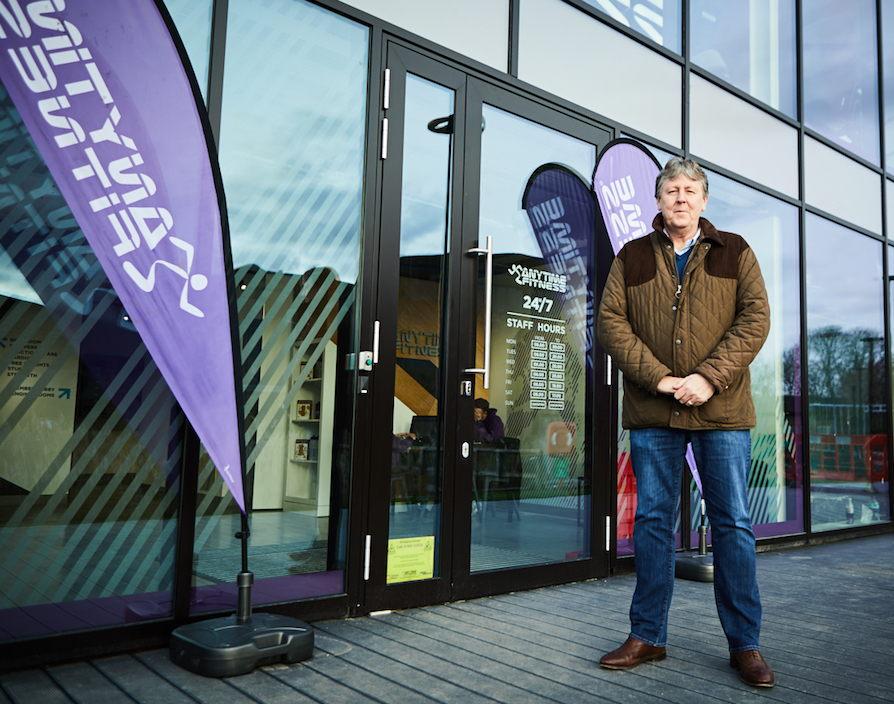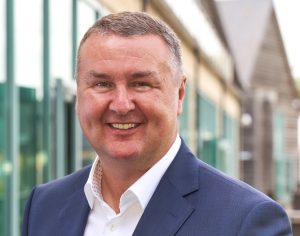When arranging an interview with Stuart Broster, CEO of Anytime Fitness UK, it was decided the meeting would be at the gym franchise’s head office in Watford’s Croxley Business Park. Meanwhile, the photo shoot was to take place at the freshly-opened – as in so fresh I could smell the decorating materials on arrival – neighbouring gym, just a couple of minutes’ walk away from the HQ. So you’d be forgiven for thinking such a prime location was an exclusive company-owned site but that’s not the case. “We have no company-owned sites – I think that’s a conflict [of interest],” says Broster. “I would avoid it as much as we could ever avoid it. I wouldn’t want to have owned clubs.” You may wonder why he’s so vehemently against the idea but it all stems back to his time in hospitality, during which he ran a hotel management business and, surprise, had no hotels of his own. “I used to say to the owners ‘We’re dealing with your business, we’re not looking after ours,'” he explains. “And if we had owned hotels people would say ‘Oh well, you’re spending all the time on your own hotels’. So I try to avoid it if I can.” Indeed, although the business does have the infrastructure in place to run its own gyms, it’s now at 160 franchise-owned locations, so clearly the franchisor is doing something right.
But when Broster was just 18-years-old, it was the hospitality industry, rather than health and fitness, that he’d set out to make his name in. Having completed a Higher National Diploma on the subject at Buxton College, he set off for Scotland and started working. “Really like anything in life, you fall into something sometimes,” says Broster of hospitality’s lure. “I was working at a local restaurant and thought ‘Oh this might be good.’ Then [I started] to get some education and then went to Scotland.” Specifically, Glasgow-headquartered Stakis Hotels is where he got his break. After a tragic gas explosion struck at the Royal Darroch Hotel, one of the operator’s Aberdeen establishments, and resulted in several fatalities, the location Broster was working at in the city had sales double from £30,000 a week to £60,000 as tourists looked for somewhere else to stay. “It became a Stakis hotel,” he reveals. “So I was Stakis deputy manager, hotel manager, then I eventually ended up in Leicester and opened up a hotel, which was 160-bed and I then became a regional director.” From running one hotel to six to 12 to 60, Broster’s career had taken off.
With Stakis being no stranger to acquisitions it bought LivingWell, the health club business, which paved the way for Broster to change industries and become managing director of the new subsidiary. It was a relatively straightforward transition too, as he took to the role like a member to the swimming pool. “I think when you work in the hospitality business, it’s not just a job, it’s a way of life,” Broster says. “So it’s difficult to get it out of your DNA. And I think from a health club perspective, you can offer a lot more understanding of what people want.” He points to the difference between hospitality events such as a wedding and a wake and says you become used to meeting people’s needs and acting accordingly. “So you do have to learn how to make sure you look after people, which is what the hotel business is all about – looking after people,” he explains.


Zen Terrelonge
As editor, Terrelonge can be found on the hunt for all things startup and scaleup - that's when he's not busy talking babies via DADult Life. Whether it's health or hospitality, food or philanthropy, tech or travel, he'll be seeking out the most interesting entrepreneurial developments to run in the magazine and online.

Zen Terrelonge
As editor, Terrelonge can be found on the hunt for all things startup and scaleup - that's when he's not busy talking babies via DADult Life. Whether it's health or hospitality, food or philanthropy, tech or travel, he'll be seeking out the most interesting entrepreneurial developments to run in the magazine and online.
































